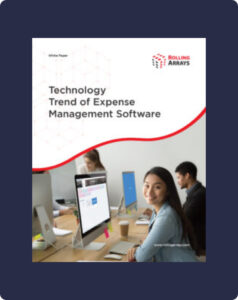
Table of Contents
Resources > Blog > Mobile First Vs AI First for expense management software
Mobile First Vs AI First for Expense Management Software
Published on Feb 10, 2023

Expense management is the process of tracking, processing, and reimbursing employee expenses for business purposes. Effective expense management can help businesses save time and money, improve compliance and accuracy, increase visibility and control, and optimise cash flow and budgeting. However, manual and paper-based processes can be tedious, error-prone, and inefficient. They can also lead to fraud, waste, and abuse of company resources.
Expense management software solutions automate and simplify the process. They allow employees to capture receipts, submit claims, and get reimbursed quickly and easily. They also integrate with accounting systems and other financial tools to ensure data consistency and accuracy.
One of the trends in expense management software development is the adoption of mobile-first and AI-first approaches.
What is mobile-first expense management software?
Mobile-first expense management software is a type of software that prioritises mobile devices as the primary platform for software development. The software is designed with the mobile user experience in mind rather than adapting a desktop or web version to fit smaller screens and touch interfaces.
Mobile-first expense management software allows users to manage their business expenses on the go using smartphones or tablets. Users can capture receipts with their device’s camera, submit real-time expense claims, and get reimbursed faster and easier. Users can also access their expense data, reports, and notifications anytime, anywhere, and on any device.
Some advantages of mobile-first expense management software are:
- It improves convenience and satisfaction, as users can perform expense-related tasks without switching devices or waiting for computer access.
- It enhances user productivity and efficiency, as users can complete expense-related tasks quickly and with fewer steps.
- It increases user compliance and accuracy, as users can submit expenses as soon as they incur them, reducing the risk of losing receipts or forgetting details.
- It provides user visibility and control, as users can monitor their spending habits and budgets and make informed decisions.
- It improves employee culture by expediting reimbursement, eliminating frustration, and increasing transparency.
- It optimises cash flow and budgeting by providing real-time visibility and control over expenses, enabling timely invoicing and reporting, and facilitating data-driven decisions.
What is AI-first expense management software?
The AI approach would be to design the system so that users can complete the process of creating, approving and settling the expense with minimal effort and time. Some possible functionalities that an AI-first expense management software provides are:
For employees:
- Automatically extract relevant information from receipts using OCR and fill in the expense details.
- Suggest expense categories and policies based on previous entries and context.
- Provide reminders and notifications for pending or overdue expenses.
- Track and report the status of expense claims and settlements.
For managers:
- Automatically flag and highlight any policy violations or anomalies in expense claims.
- Provide insights and recommendations for optimising expense budgets and policies.
- Approve or reject expenses with a single tap or voice command.
- Delegate approval authority to other managers when unavailable.
Here is a further example of how AI can aid in the process:
Create a claim
Auto-creation of claims from uploaded receipts by using OCR (Supervised ML). Training and improving the algorithm by using different receipts formats with different fonts/currencies etc.
Approval
The Unsupervised ML reads the patterns of claims submitted and categorises the claims into high-risk and low-risk claims(traffic lights alerts) to the approver. Approvers can save a lot of time by only focusing on high-risk claims.
Audit
Based on the reports and insights, Reinforcement ML can recommend how to cut down on expenses and suggest HR policies around expense management that save the organisation money.
Conclusion
AI is the new generation of expense management software that goes beyond the Mobile First design principle. AI-first technology leverages the power of artificial intelligence to automate and optimise the entire expense management process, from creation to approval to settlement. The philosophy behind AI first is to minimise the number of days from the daily expense is incurred to the day funds are transferred to the employee’s account. This means that the system is designed to ensure that expenses are created as soon as employees incur them, managers can get AI-assisted prompts to approve or reject claims, and finance teams can settle the expenses with clear ratings and prompts. AI-first technology reduces the time and effort the users require to perform their tasks on the system and increases the accuracy and efficiency of the expense management process. AI-first technology is not only a UX enhancement but also a business transformation.





